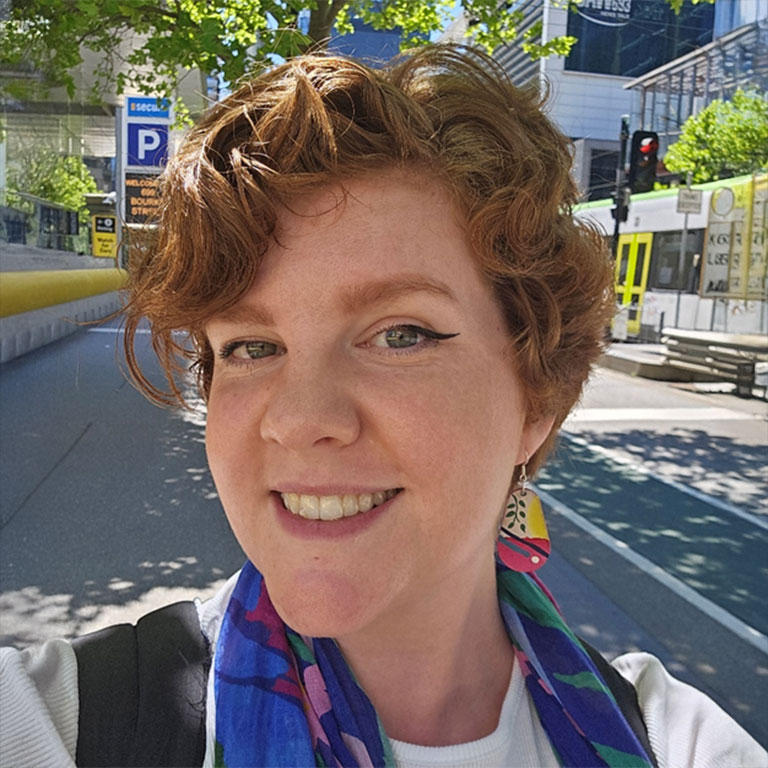
Justine
Q&A
1. What brought you to Think Pink initially, and how has the foundation supported you in your journey?
I was diagnosed with breast cancer in Oct 2023 at the age of 33. I was the first person in my social circle to have been diagnosed with that type of cancer and it was overwhelming to say the least. I can’t remember if it was a Google search or a flyer in the hospital waiting room, but I discovered the Think Pink Foundation when I was on the hunt for more information about breast cancer. I discovered they were running a Christmas lunch a few days after I was discharged from hospital and so registered in the hopes I would connect with some other breast cancer survivors. As supportive as my friends and family were, it was different to connect with others who could empathise with my situation and knew all the terminology. It definitely helped me feel less alone during a challenging time!
2. Can you share a specific moment when you felt especially supported or empowered by Think Pink?
I attended a couple of the Zoom support sessions facilitated by the Think Pink Foundation. I recall one time, I had thought I was doing well but ended up getting quite emotional and expressing it all on the call. It was hard not to feel embarrassed or guilty for trauma dumping on everyone, however they were all so lovely and supportive. They didn’t panic the way my friends or family would have, because they understood how much the whole situation sucked and how powerless we all were. It was really helpful to have others hold space for me and for me to be able to do that for others in return.
3. How has Think Pink helped you feel connected and supported during your journey with breast cancer?
Please see the previous answer.
4. Why do you think services like those offered by Think Pink are so important for people going through breast cancer?
Breast cancer is so common, and yet still so isolating and overwhelming. Support services offered by the Think Pink Foundation make such a difference to individuals who collectively make up such a big part of our community. It might feel somewhat niche but it offers help to so many people.
5. What kind of events or activities do you expect Think Pink to hold in the future?
I already participate in a couple of the current programs, and very much appreciated those. It would be wonderful to have more in-person community events. I would love to attend walking groups, creative workshops, coffee catch-ups etc. I think some sessions are most relevant to active treatment and early survivorship, however it would also be fabulous to see a “roadmap” to later survivorship. I know everyone’s pace would be very different as we all are managing very varied chronic conditions, however I wonder if there would be a way to help the transition from the intense first couple of years to the longer-term lifestyle. For example, providing a self-guided worksheet that helps us identify some feasible fitness, career or family planning related goals and then connecting us with other people who are at a similar phase of survivorship. I don’t always want to be talking about cancer treatment, but it is nice connecting with other people tackling similar life issues who “get it”.
Story
I was diagnosed with breast cancer in Oct 2023 at the age of 33. I was the first person in my social circle to have been diagnosed with that type of cancer and it was overwhelming to say the least.
I discovered the Think Pink Foundation when I was on the hunt for more information about breast cancer. They were running a Christmas lunch so registered in the hopes I would connect with some other breast cancer survivors.
As supportive as my friends and family were, it was different to connect with others who could empathise with my situation and knew all the terminology. It definitely helped me feel less alone during a challenging time!
I attended a couple of the Zoom support sessions facilitated by the Think Pink Foundation. One time, I had thought I was doing well but ended up getting quite emotional and expressing it all on the call. It was hard not to feel embarrassed or guilty for trauma dumping on everyone, however they were all so lovely and supportive.
They didn’t panic the way my friends or family would have, because they understood how much the whole situation sucked and how powerless we all were. It was really helpful to have others hold space for me and for me to be able to do that for others in return.
Breast cancer is so common, and yet still so isolating and overwhelming. Support services offered by the Think Pink Foundation make such a difference to individuals who collectively make up such a big part of our community. It might feel somewhat niche but it offers help to so many people.
